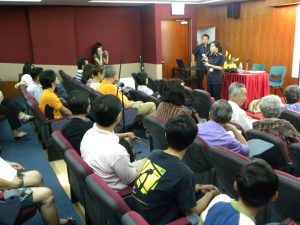Rules on subletting to foreigners
Having the extra income is great but if you don’t do it right, you could suffer the consequences.
BY: Eleanor Yap
 If you have a Housing and Development Board (HDB) flat or a condo and you are looking to get some extra income from subletting one of your rooms, you might want to be extra careful, especially if it is to a foreign tenant like an overseas student or a professional who has come into town to work. Your tenant could be illegal or has a shady past, which you certainly do not want living under the same roof as you. According to a talk on subletting of rooms or flats to foreign tenants held recently at the Hougang Community Centre, you as a homeowner are “required by law to conduct due diligence checks”.
If you have a Housing and Development Board (HDB) flat or a condo and you are looking to get some extra income from subletting one of your rooms, you might want to be extra careful, especially if it is to a foreign tenant like an overseas student or a professional who has come into town to work. Your tenant could be illegal or has a shady past, which you certainly do not want living under the same roof as you. According to a talk on subletting of rooms or flats to foreign tenants held recently at the Hougang Community Centre, you as a homeowner are “required by law to conduct due diligence checks”.
According to the Golfred Tham, assistant superintendant at the Immigration & Checkpoints Authority’s (ICA) Community Involvement Branch, in 2007 there were 3,000 illegal immigrants (those who entered Singapore illegally) who were arrested in Singapore. The figure went down in 2008 to 2,400. For overstayers who were arrested in 2007, there were 4,800 and that figure also dipped to 3,600 in 2008. For those who give shelter to illegal immigrants or overstayers or what is termed as harbourers, there were 190 who were arrested in 2007. That figure dropped in 2008 to 110.
Three important checks
So if you are going to rent your room or flat to a foreign tenant, be it someone who has a Student or Long-Term pass, or Work (common types of employment, work or S) pass from the Ministry of Manpower (MOM), there are three checks that you are required to do:
1) Check the original immigration and/or work passes. Photocopies are not acceptable.
2) Cross-check particulars on these passes against particulars on his original passport, such as his name, nationality and date of birth.
3) Most people do not do this but you need to verify the validity of the pass either by checking with ICA for the immigration pass or MOM or the employer for the work pass. Use their online service to verify the validity of the pass. For ICA, use the e-service VERIFI to verify the validity of the immigration pass. Retain the printout of the result of your enquiry, be it from ICA or MOM, as evidence of your check.
During the talk, Tham shared two ways to detect if a pass was genuine. One being that the Merlion image and the number on it can be seen only one at a time when the pass is tilted at different angles. If both can be seen at the same time, the pass is likely to be a fake. The type of immigration pass is always indicated on the back of the pass, whilst the type of work pass is on the front.
 Consequences of harbouring
Consequences of harbouring
Under the Immigration Act, the homeowner is liable to be charged for harbouring if he is found not to have done the due diligence checks and the tenant is found to be an immigration offender. If he is found guilty of negligence by only carrying out two of the three due diligence checks, he may be liable to a fine of up to $6,000 or 12 months in jail or both. If only one or none of the due diligence checks was done and he is found guilty, he can face a fine of up to $6,000 and not less than six months and not more than two years’ imprisonment.
Added ICA’s Teng Mui Mui, superintendant and head of the Community Involvement Branch, “We are asking you to check validity and not authenticity of the pass.” She also shared possible scenarios that might crop up when subletting. If the prospective tenant says that he does not have his passport as his boss has it, Teng said to ask him to return the next day with his passport.
Homeowners should not allow persons other than their tenants to stay in the rented room or flat. She advised that it is important to hold on to paper evidence that the due diligence checks have been made in case a police or ICA officer requests for proof of check. In the case of a homeowner engaging a housing agent, then it is also the agent’s responsibility to do the due diligence checks as he is paid by the homeowner to do it.
So take note, having the extra income from subletting can be great for any homeowner, however, it is little comfort if it also includes a fine or a jail time if you are found guilty of harbouring immigration offenders.
** For more information on ICA or MON, check out their websites at www.ica.sg or www.mom.gov.sg respectively.
WRITER’S NOTE: According to an article in “Today” newspaper, come February, owners of HDB flats who sublet rooms will have to register with HDB within seven days of doing so. From February 1, owners will also have to tell HDB when they renew or terminate a sublet, and when there are changes to their sub-tenants’ particulars. This new rule is in an effort to eradicate loan-shark activities and better protect residents. This rule applies to all new and existing cases of room sublets. Owners who sublet their flats before February 1 have a six-month grace period to register. Those who break the rule face a penalty of up to $3,000 and “their flat may compulsorily acquired if they repeatedly fail to comply with the rule”, said the article. Registration can be done online (www.hdb.gov.sg) or at a HDB branch office.
(PHOTO CREDITS: ICA)

0 Comments